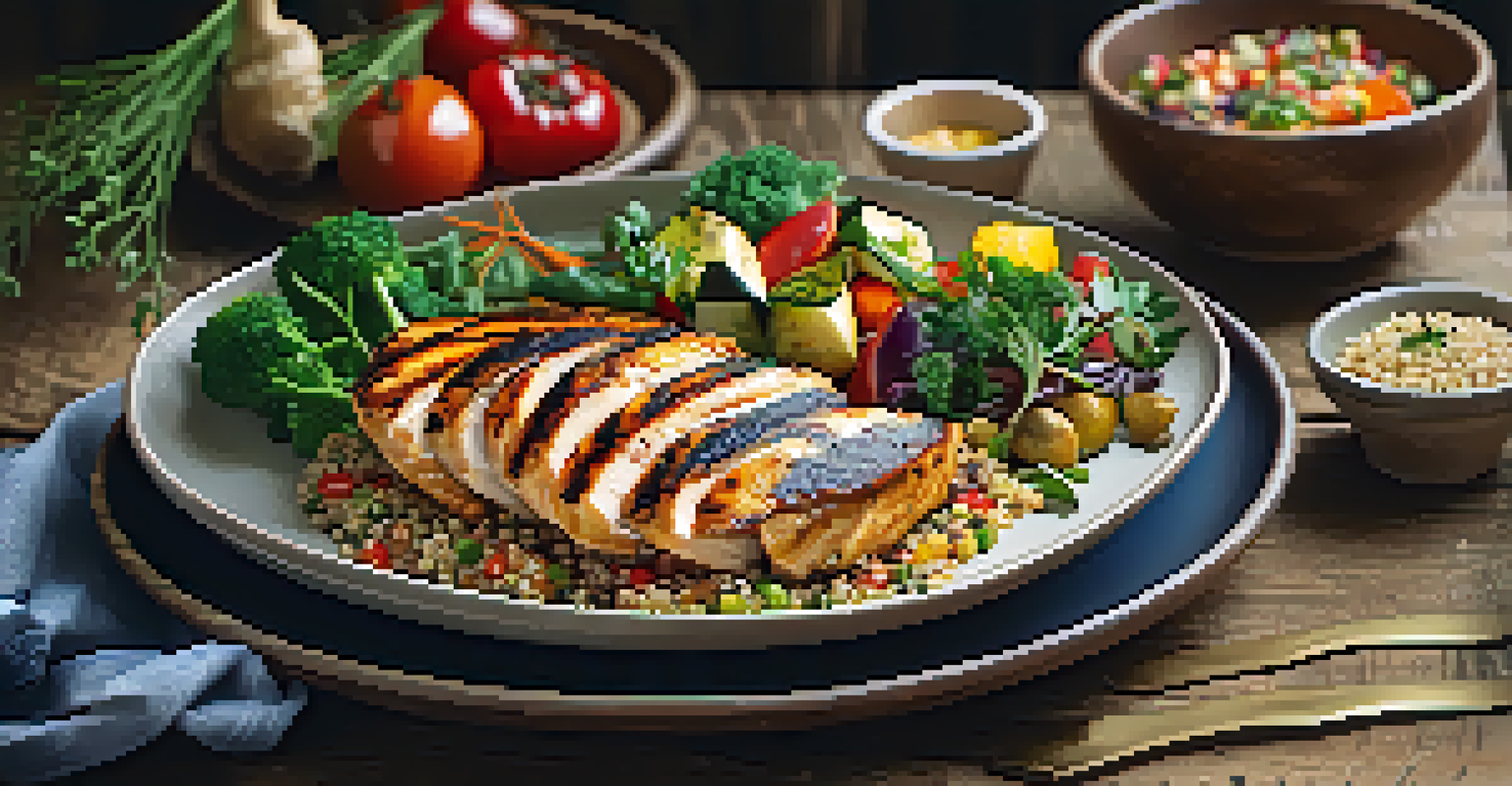Cooking Classes for Weight Management: Health and Balance

The Importance of Cooking Skills for Weight Management
Cooking skills are essential for anyone looking to manage their weight effectively. By preparing meals at home, you gain control over ingredients, portion sizes, and cooking methods, which are crucial for a balanced diet. For example, a homemade vegetable stir-fry can be a nutritious alternative to a high-calorie takeout option.
Cooking is like love. It should be entered into with abandon or not at all.
Moreover, learning to cook allows you to experiment with healthier ingredients, making the process enjoyable rather than restrictive. When you understand the basics of cooking, you can whip up delicious meals that satisfy your cravings while keeping your health goals in check. This creativity in the kitchen can transform your relationship with food.
Lastly, cooking classes often provide hands-on experience, making it easier to grasp new techniques and flavors. This practical approach not only boosts your confidence but also equips you with the knowledge to make healthier choices daily. The more you cook, the more comfortable you become in the kitchen, which can lead to lasting lifestyle changes.
How Cooking Classes Promote Healthy Eating Habits
Participating in cooking classes can significantly influence your eating habits. These classes often emphasize the importance of fresh, whole ingredients and teach you how to incorporate them into your meals. When you learn how to prepare healthy dishes, you're more likely to choose these options over processed foods.

Additionally, cooking classes provide a supportive environment where you can share experiences and tips with others. This communal aspect not only makes learning more enjoyable but also reinforces healthy eating habits through social accountability. When everyone around you is focused on health, it can motivate you to stick to your goals.
Cooking Skills Aid Weight Control
Learning to cook empowers individuals to manage their weight by controlling ingredients and portion sizes.
Furthermore, cooking classes often highlight the nutritional value of different foods, helping you understand what your body needs. By learning about macronutrients and how to balance them, you can create meals that nourish you without compromising on taste. This knowledge empowers you to make informed choices in your daily diet.
Building a Balanced Meal: Key Components to Focus On
A balanced meal typically includes a variety of food groups, ensuring you receive essential nutrients. When taking cooking classes, you'll learn the importance of incorporating proteins, healthy fats, and fiber-rich carbohydrates. For instance, combining grilled chicken with quinoa and a colorful array of vegetables creates a plate that is both nutritious and satisfying.
The act of cooking is a way to express love, creativity, and care for ourselves and others.
Another crucial aspect of building balanced meals is understanding portion sizes. Cooking classes often provide guidance on how to measure and serve appropriate portions without feeling deprived. This knowledge helps you avoid overeating while still enjoying the foods you love.
Lastly, don’t forget the role of hydration in a balanced diet. Cooking classes might also cover healthy beverage options, such as infused waters or herbal teas, that can complement your meals. Staying hydrated is essential for overall health and can aid in weight management as well.
Exploring Dietary Restrictions in Cooking Classes
Cooking classes can also cater to specific dietary restrictions, making them inclusive for everyone. Whether you're gluten-free, vegetarian, or have food allergies, many classes offer tailored recipes and techniques to accommodate your needs. This ensures that you can enjoy the benefits of cooking while honoring your health requirements.
Moreover, learning to cook within your dietary constraints can open up a world of flavors and options. For instance, a vegan cooking class can teach you how to create hearty, plant-based meals that are both delicious and satisfying. This exploration can be a delightful journey towards discovering new ingredients and cuisines.
Cooking Classes Foster Healthy Choices
Participating in cooking classes encourages healthier eating habits through hands-on experience and community support.
Additionally, understanding how to adapt traditional recipes to fit your dietary needs empowers you as a cook. With the right skills, you can transform classic dishes into healthier versions without sacrificing taste. This flexibility in the kitchen is a game changer for anyone managing their weight.
Cooking Classes: A Community for Support and Motivation
One of the most rewarding aspects of cooking classes is the community you build with fellow participants. Sharing a common goal of health and wellness creates a supportive atmosphere where everyone motivates each other. This camaraderie can be incredibly uplifting and can make the journey toward weight management feel less daunting.
Additionally, cooking classes often host events and challenges that encourage group participation. These can include cooking competitions or themed dinner nights, which foster teamwork and friendly competition. Engaging in these activities not only makes learning fun but also reinforces healthy habits through social interactions.
Lastly, having a community can provide accountability. When you share your goals with others, you're more likely to stick to them. This network of support can be invaluable, especially during challenging times when motivation wanes.
The Role of Mindfulness in Cooking and Eating
Mindfulness is a powerful tool in both cooking and eating, and many cooking classes emphasize this practice. By focusing on the process of cooking—savoring the colors, textures, and aromas—you can create a deeper connection with your food. This awareness can lead to more intentional eating habits, helping you appreciate each bite.
Moreover, practicing mindfulness while cooking can reduce stress, making the kitchen a sanctuary rather than a chore. When you approach cooking with a calm, focused mindset, you’re more likely to enjoy the experience and experiment with new recipes. This joyful approach can enhance your overall relationship with food.
Mindfulness Enhances Cooking Experience
Practicing mindfulness in cooking promotes a deeper connection with food, leading to more intentional eating habits.
Incorporating mindfulness into your meals can also help you listen to your body’s hunger cues. When you eat slowly and mindfully, you can better gauge when you’re full, preventing overeating. This practice can be a game-changer for weight management, creating a healthier balance between nourishment and enjoyment.
Long-Term Benefits of Cooking Classes for Weight Management
Investing time in cooking classes can yield long-term benefits for your health and weight management journey. By equipping yourself with essential cooking skills, you’re more likely to continue making healthier choices long after the classes end. This foundation sets the stage for a sustainable lifestyle change that goes beyond temporary diets.
Additionally, the knowledge gained from cooking classes often leads to increased confidence in the kitchen. With practice, you’ll find yourself trying new recipes and techniques without hesitation. This growth not only makes cooking enjoyable but also encourages a diverse and balanced diet essential for maintaining a healthy weight.

Lastly, the relationships you form during these classes can provide ongoing support. Many participants stay connected even after completing the course, sharing recipes and tips along the way. This continued network of encouragement can be crucial in maintaining your weight management goals over the long haul.